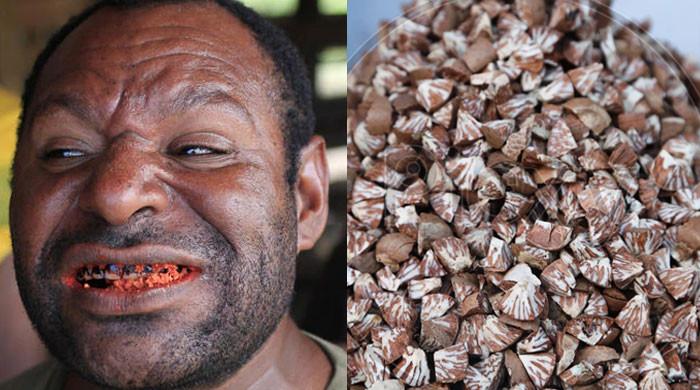In Papua New Guinea, where betel nuts are a cultural staple, oral cancer per capita is the highest globally
In the heart of Papua New Guinea, betel nut, a psychoactive substance, is deeply ingrained in daily life, offering a ritualistic awakening to millions, including civil servant David Taim.
Yet, despite its popularity, the world remains largely unaware of the betel nut’s addictive grip and its ominous link to a cancer surge.
The betel nut, originating from the areca palm, ranks as the fourth most widely-used psychoactive substance globally, trailing only caffeine, nicotine, and alcohol.
With estimates suggesting 600 million regular users worldwide, the nut’s production has more than doubled in the last two decades.
Chewing styles vary across regions, from India’s mass-manufactured packages to the unadulterated habits of the Chamorro people in the Mariana Islands. Despite the diversity, the nut delivers a consistent mild euphoria, fueling its burgeoning popularity.
However, beneath the cultural significance lies a troubling reality. Studies dating back to the early 20th century hinted at a connection between betel nuts and cancer, a link solidified by the International Agency for Research on Cancer in 2004.
The nut’s classification as a group 1 carcinogen hasn’t stemmed its global consumption, especially in tropical Asia and the Pacific, where oral cancer rates soar.
In Papua New Guinea, where betel nuts are a cultural staple, oral cancer per capita is the highest globally. Weak healthcare systems and a lack of awareness exacerbate the issue, leading to late-stage diagnoses and limited chances for treatment. Even in regions with more robust healthcare, such as the Northern Mariana Islands, the impact is severe.
American surgeon William Moss, shocked by the disproportionate oral cancer rates in the Mariana Islands, likens the betel nut issue to the early tobacco crisis. Despite the clear carcinogenic link, sales remain largely unregulated, echoing a familiar narrative from the tobacco era.
Efforts to curb the betel nut trade, like the 2013 ban in Port Moresby, face resistance due to economic dependencies. A lack of awareness among chewers about the nut’s carcinogenic nature compounds the challenge. Minor restrictions reappeared in 2023, prompting concerns about livelihoods.
In addressing this crisis, Thaddeus Herzog, a researcher at the University of Hawaii Cancer Center, emphasises the need for cessation programs.
Drawing inspiration from tobacco cessation, Herzog’s team focuses on behavioural programs tailored to betel nut users, recognising the distinct challenges posed by cultural differences and limited awareness.
While these initiatives aim to mitigate the betel nut’s impact, the journey towards widespread awareness, regulatory measures, and effective cessation strategies remains a complex and pressing task.


